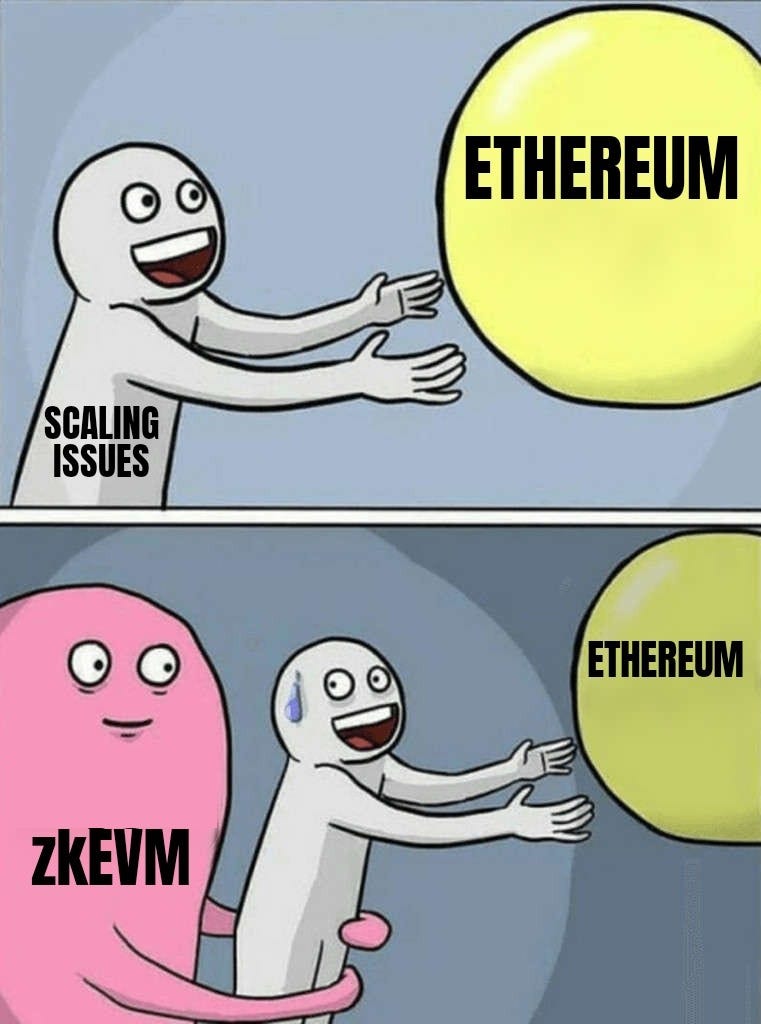Why Crypto is Underrated, are Regulations any Good, and how zkEVM will Scale Blockchains to the Next Level
The Web Three Newsletter | Jan 18, 2023
We curate and summarize three key opinion pieces or industry updates from the world of crypto, weekly
This week, we take a look at:
1️⃣ Why crypto is underrated, and insights on regulators, FTX, Enron, and more | Key takeaways from an episode on the Bankless Podcast
2️⃣ Is government regulation any good for crypto markets? | Summary of an opinion piece published in the CryptoPotato publication
3️⃣ zkEVM: Scaling Blockchain Transactions to the Next Level | Brief outline of twitter thread by @TheDeFISaint
Section1️⃣- Why crypto is underrated
Economist, columnist & polymath Tyler Cowen makes the case for why crypto is underrated & shares his insights on regulators, FTX vs Enron, and more.
This is a summary of an episode from the Bankless Podcast
Is crypto underrated - or overrated ?💡
Crypto has become underrated by most intelligent and honest observers. Despite the recent collapse of FTX, crypto has the potential to help poor people around the world by reducing remittance fees from 7% to 1 or 2%.
It's one of the few truly new ideas in decades, but it's deeply weird, counter-intuitive and misleading to call it cryptocurrency. It's not necessarily a money and we still don't know which use cases will succeed.
However during peak bull market euphoria, crypto was overrated by a large block of people who simply thought it was an almost ‘automatic’ way to riches, and that it was going to revolutionize the nation state - which the speaker has never believed in.
Is Crypto Worth the Risk of Scammers and Fraudsters? ⚠️
Critics argue that crypto increases the surface area for scammers and fraudsters. They question if crypto is worth the risk when anyone can launch their own coin and scam people using social media.
However, Tyler argues that the supply of scams is now infinitely elastic and crypto is just an intermediate step in the proliferation of scams. He also mentions that scams are not unique to crypto and they exist in other industries as well. In the final analysis, the scamming equilibrium will be what it is, with or without crypto.
Pausing to Reflect on Regulation 🤔
As regulators in the crypto industry grapple with how to regulate the rapidly-evolving technology, some experts argue that it's better to wait and learn more before moving forward with regulations.
While it's not a call for zero regulation, a hurried bipartisan move against crypto following a highly visible public event could be a mistake. The regulators themselves may not yet know what they're doing, and imposing restrictions on well-identified third-party institutions such as Coinbase may not be the best approach.
Instead, experts suggest waiting to see which use cases are sustainable and then determining the appropriate bodies of law for regulating them.
Balancing Privacy and Regulation in the Crypto Space ⚖️
As the crypto space continues to evolve, the question of privacy on-chain has become a hot topic. In the U.S, recent action against privacy tools such as Tornado Cash has sparked debate about how to balance privacy with the need for regulation.
Some experts argue that it's unrealistic to expect complete financial privacy, while others caution against a government overreaction that could lead to total surveillance. The technology is evolving rapidly and it's difficult to predict what the future holds, but some experts suggest that a state of indifference may be the most comfortable equilibrium, where individuals have some level of privacy but it's not a major concern for government or other entities.
Parallels between FTX and the Enron saga 🚨
The recent collapse of crypto exchange FTX has sparked concerns about over-regulation in the crypto space, with some experts drawing parallels to the Enron scandal of the early 2000s.
The Enron scandal led to the passing of the Sarbanes-Oxley Act, which made it harder for companies to be publicly traded and had a ripple effect on the economy, leading to a rise in income inequality.
Experts caution against a similar knee-jerk reaction to the FTX collapse and a rush to regulate crypto in a way that could squash innovation and limit the expression of crypto networks. They argue that regulators should wait and thoughtfully consider the long-term consequences of their actions.
The Impact of Sarbanes-Oxley and Wealth Inequality in America 💸
Sarbanes-Oxley, legislation passed to prevent another Enron scandal, has had unintended consequences on wealth inequality in America. The law imposed stricter accounting requirements on publicly traded companies, leading to fewer companies going public and higher valuations for private companies.
This meant that most individuals did not have the opportunity to invest in these companies at their earlier stages, leading to returns being reaped by Venture Capitalists and contributing to income inequality. Additionally, laws around accredited investors and net worth requirements also limit access to these early stage investments for lower income individuals.
Risk vs Reward of Crypto Regulation: Why Goldman Sachs Isn't the Answer 💰
Tyler highlights the importance of allowing crypto innovators to be nimble, low cost, and willing to think outside the box. He mentions that regulatory institutions may not fully understand the crypto industry and may be too overbearing, similar to how the automobile and airplane industries were in their early stages. He also brings up the question of what is at stake for the US in terms of losing innovation and leaders like Vitalik Buterin.
Will Regulators Choke Out Crypto Innovation in the US? 🔒
Are regulators and lawmakers in the US a threat to the future of crypto innovation? The podcast delves into the potential risks and rewards of crypto regulation, and how it could affect the growth of the industry within the US.
The question of whether the US can "choke off" crypto globally is also discussed, as well as the comparison to the early days of the internet and why the US was quick to adopt it. With the crypto market being decentralized, it raises the question of what is at stake for the US in terms of losing innovation and leaders like Vitalik Buterin.
Self-Regulation in the Crypto Industry: Is it Possible?🤔
The podcast also raises the question of whether the crypto industry can self-regulate and if it is a viable option. Tyler suggests that complete self-regulation may not be enough in the long run, but until sustainable use cases are identified, it may be better to wait and let people experiment.
He also mentions that there is a standoff between the crypto industry, the CFTC, and the SEC, and the question of whether self-regulation is possible and too hopeful of an aspiration for the crypto industry is brought up.
The episode also subsequently touches upon AI regulation, AI’s “SBF moment”, economists & crypto, free market & greed, and other topics.
Section2️⃣- Is government regulation any good for crypto markets?
A look into government regulation on the crypto industry, and the role it played in the recent insolvency crisis, as we delve into the lessons to be learnt from the Alameda-FTX bankruptcy.
Summary from an opinion piece published in the CryptoPotato publication
The Crypto Industry's Insolvency Crisis💸
The crypto industry has been hit hard in recent years, with several major exchanges going bankrupt, causing immense financial damage to investors. The most recent and high-profile case is that of Alameda-FTX, which filed for bankruptcy in November 2022.
The company's CEO, Sam Bankman-Fried, has blamed the insolvency on a targeted crash precipitated by the CEO of Binance. However, this begs the question of whether government regulation played a role in the downfall of Alameda-FTX and other crypto exchanges.
The Role of Government Regulation in Crypto 🔒
The industry was built on the idea of being a decentralized, peer-to-peer alternative to traditional finance. However, in recent years, Wall Street "TradFi" players have entered the space, bringing with them the same financial shenanigans and accounting horrors that plague traditional finance. This is evident in the case of Alameda-FTX, which was run by a political megadonor who had nurtured cozy relations with the U.S. regulatory regime.
Striking a Balance Between Regulation and Decentralization ⚖️
This raises the question of whether more government regulation is needed in the crypto industry. On the one hand, it could prevent future insolvencies by ensuring that exchanges are run in a responsible and transparent manner. On the other hand, too much regulation could stifle innovation and undermine the decentralized nature of crypto.
Learning from the Mistakes of the Past 📚
The solution may lie in finding a balance between regulation and decentralization. This could include implementing stricter accounting and financial reporting standards for crypto exchanges, while also promoting decentralized alternatives such as peer-to-peer lending and decentralized exchanges.
We shouldn’t let TradFi bros turn it into their evil twin 💼
The crypto industry is still in its infancy, and it is crucial that we learn from the mistakes of the past. The lesson in the Alameda-FTX bankruptcy is that government regulation alone is not the answer.
Instead, we must find a way to strike a balance between regulation and decentralization to ensure the long-term success and stability of the crypto industry. It is important to keep in mind that crypto is fundamentally a no-nonsense, hard-money, anti-Wall Street industry, but we should not let the Wall Street TradFi bros turn it into their evil twin.
Section3️⃣- zkEVM: Scaling Blockchain Transactions to the Next Level
Exploring the advantages and limitations of Optimistic and ZK Rollups and how zkEVM aims to address them
Summary of twitter thread by @TheDeFISaint
Optimistic and ZK Rollups Method to Scaling 🚀
Optimistic Rollups process transactions off-chain, bundling or Rollup the transactions back to the Ethereum Mainnet. To prove the validity of a transaction, it's based on assumption and uses "Fraud Proofs" to verify transactions.
ZK Rollups Limitations ⚠️
ZK Rollups use "Validity Proofs" to validate transactions and since it's not based on assumption like Optimistic Rollups, its method of verifying transactions is by computation to provide Cryptographic Proofs. But, this method of computing transactions takes time and it's not EVM-compatible.
zkEVM Overview 🔍
zkEVM, which stands for Zero Knowledge Ethereum Virtual Machine, is considered the "Holy Grail" of Scaling because of its method of scaling. It's an upgrade to ZK Rollups as it aims to replicate the Ethereum environment as a Rollup, allowing developers to build on them like they would on Ethereum.
Why zkEVM? 🤔
The aim of zkEVM is to overcome the limitations of ZK Rollups technology. Not being EVM-compatible is a major drawback in ZK Rollups technology.
Important Facts to know 💡
Its advantage includes faster prover time.
Its disadvantage is more incompatibility.
Runs at the language level.
zkSync 2.0 Testnet is still live.
Makes use of zkPorter to increase its Scalability (up to 20,000 TPS)
Testing the Waters 🌊
Here's a link to use the Testnet 🎯 https://portal.zksync.io/bridge
Overall, zkEVM offers a promising solution for scaling and improving the efficiency of blockchain transactions. It aims to solve the limitations of ZK Rollups and provide a more EVM-compatible option for developers. With the zkSync 2.0 testnet currently live, it's worth exploring and testing the potential of zkEVM for your project. 🚀🔥
Subscribe to receive our weekly newsletter and in-house research content!
Please Share, Leave Feedback, and Follow Us on Twitter, Telegram, and LinkedIn to stay connected with us.







